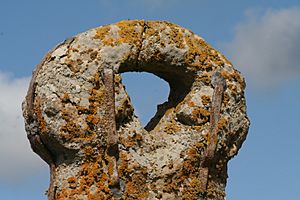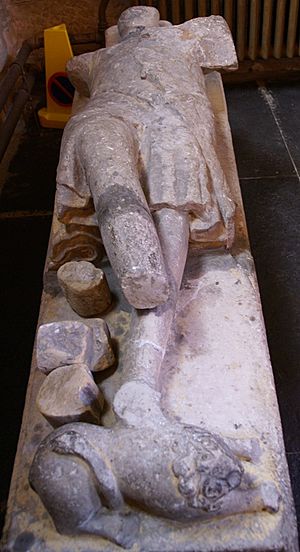Battle of Embo facts for kids
The Battle of Embo was an important fight that happened in 1245. It took place in a place called Embo in Sutherland, Scotland. In this battle, Scottish fighters bravely faced off against Viking invaders. The Scottish forces won, stopping the Vikings from taking over.
Quick facts for kids Battle of Embo |
|||||||
|---|---|---|---|---|---|---|---|
 The Earl's Cross which marks the site of the battle |
|||||||
|
|||||||
| Belligerents | |||||||
| Commanders and leaders | |||||||
| William Sutherland Richard Murray † |
unknown † | ||||||
Contents
What Happened at Embo?
The first story about the Battle of Embo comes from Sir Robert Gordon, 1st Baronet. He wrote about it in his book, A Genealogical History of the Earldom of Sutherland. Gordon lived much later, from 1580 to 1656.
The Viking Invasion
Sir Robert Gordon wrote that "Danes and Norwegians" attacked northern Scotland. These were the Vikings, who often raided lands far from their homes. The Scottish leader, William de Moravia, 1st Earl of Sutherland, heard about the invasion.
Scottish Defenders
Earl William sent his trusted "servant," Richard de Moravia, to stop the Vikings. Richard was supposed to hold them back until the Earl could arrive. Earl William was gathering a bigger army to fight the invaders.
A Surprising Victory
According to Gordon, the Vikings tried to run away. Earl William and his men chased after them. During the fight, the leader of the Vikings was killed. Many other Vikings also died in the battle. Sadly, Richard de Moravia, the brave Scottish fighter, was also killed. The Earl of Sutherland secured the victory for Scotland. He supposedly killed the Viking general using a very unusual weapon: the severed leg of a horse!
After the Battle
After the Scottish victory, Earl William made sure Richard de Moravia was honored.
Richard's Burial
Richard de Moravia was buried in Dornoch Cathedral. This is a very old and important church. A statue was also put up in the cathedral to remember him.
A Memorial Cross
A cross was also put up to mark the battle site. This cross, along with the graves of many who died, could still be seen hundreds of years later. People in the 1600s could still visit these spots.


